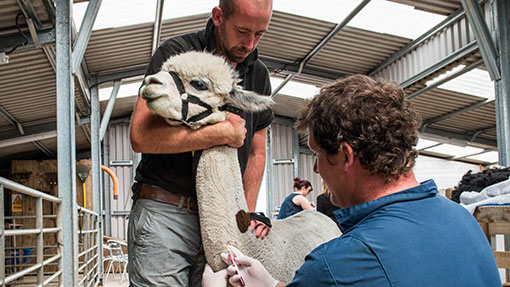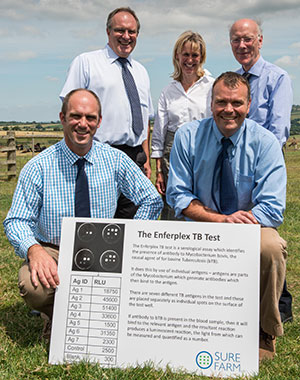‘Groundbreaking’ TB blood test for camelids launched

A new government-approved TB test for camelids – llamas and alpacas – has been launched.
The voluntary system for farmers for testing camelids has been developed over the last two years in conjunction with Defra and the Animal Health and Veterinary Laboratories Agency (AHVLA).
Co-developer SureFarm has described the new serological (antibody) blood test, called “SureFarm Camelid Diagnostics”, as “groundbreaking”.
And they have claimed it gives “far greater accuracy” than the current tuberculin skin test used for camelids, which is also used for cattle.
Read also: Farmer tells story of how she caught TB
In the British Alpaca Society trial the accuracy of the test in camelids was found to be close to 100% specific, with an extremely low risk of the test developing false positives.
“We are not looking to replace the skin test, but we are looking to use this new blood test to boost the overall sensitivity detection (of TB),” he explained.
The diagnostic test, which costs around £12 per animal, only requires a single blood sample to be taken for testing of camelids.
It can identify seven antibodies the animal produces in response to M bovis to give a more accurate result over whether the animal is carrying TB or not.
“It is a pure blood test. It is sent away to a laboratory and the expectation is that the results can be turned around in seven to 10 days,” said Mr Hayton.
“The more different antibodies you search for, the better chance you have got of picking up the disease.”
Research has shown that the test can also be used to detect bovine TB in milk with similar results, he added.
SureFarm, a subsidiary of Synergy Farm Health, said research was ongoing to see if the same test could be used to identify bovine TB in other animals, including cattle.

The company said it was preparing an application to submit to Defra to trial the blood test on cattle in the UK.
“Yes, we think there’s an application for it (in cattle). We are looking to push that agenda forward,” said Mr Hayton.
In the UK, it is estimated there are over 37,000 alpacas and between 3,000-4,000 llamas.
Each year, there is a TB breakdown in around 10 to 15 alpaca or llama herds, which is far lower than the estimated 30,000 TB outbreaks in cattle.
However, it is hoped that the new test will be used to help identify TB more accurately in herds and maintain the integrity and security of the UK camelid industry.
There is a strong demand for the high quality genetics in British alpacas and having animals accurately tested in the scheme, could boost commercial opportunities for camelids, including the export of stock to Europe.
Claire Whitehead, president of the British Camelid Veterinary Society, said: “Bovine TB is not prevalent in camelids but the introduction of this new serological blood test will take away the uncertainty of the skin test and provide an opportunity for owners to verify the health of their herds.”
Peter Roissetter, chairman of the British Alpaca Society, added: “We are very pleased that the government has approved this groundbreaking scheme launched by SureFarm.
“We are optimistic that the government will soon finalise a realistic compensation package and the protocols for use in a confirmed bovine TB breakdown, which will complete the overall approach we take in combatting this disease.”
NFU deputy president Minette Batters said: “I applaud all the work that has been put into this voluntary investment that has got this launch under way.
“It’s so difficult to get an accurate reading with the existing skin test. Getting a result which is near to a 100% ‘yes’ would be a massive step forward.”
Ms Batters added that she would be very keen to see the diagnostic test trialled on bovines. “It’s another tool in the box that we have to look at. To have a test that we could use on blood or saliva in wildlife or in cattle – that’s the golden bullet.”
The new test was launched at a farm demonstration at Inca Alpca, Amberley Farm, in Higher Chilfrome, Dorchester, Dorset on Thursday (17 July).
